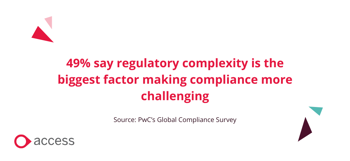
Enterprise payroll compliance explained
In PwC’s recent Global Compliance Survey, 91% of UK organisations say compliance complexity has increased.
Enterprise payroll compliance operates at a fundamentally different level to smaller organisations. Where a single-location business might focus on straightforward PAYE calculations and basic reporting, large enterprises navigate multiple layers of regulatory requirements that can change depending on employee location, contract type, and business structure.
UK-specific legal considerations
The UK's regulatory framework presents challenges for enterprise organisations. Real Time Information (RTI) reporting becomes significantly more complex when managing multiple payrolls with different pay frequencies. Organisations operating weekly, monthly, and annual bonus cycles need systems that can handle varying submission deadlines whilst maintaining data accuracy across all reporting periods.
Auto-enrolment obligations create additional complexity for enterprises with diverse workforces. Different employee groups may qualify for different pension schemes, and managing re-enrolment cycles across thousands of employees requires careful coordination. The recent changes to contribution rates and earnings thresholds add another layer of complexity, particularly for organisations with employees moving between different pay bands or contract types.
Benefits-in-kind reporting through P11D submissions becomes exponentially more challenging at scale. Enterprise organisations often provide varied benefit packages across different divisions or seniority levels. Company cars, private healthcare, and share options all require different calculation methods and reporting timelines. Getting these calculations wrong can result in significant penalties and employee tax complications.
Employment status determination has become increasingly important following recent IR35 changes and gig economy growth. Large organisations frequently engage contractors, consultants, and temporary workers alongside permanent employees. Each category carries different tax obligations and reporting requirements, making accurate classification crucial for compliance.
Global payroll compliance complexity
For international organisations, compliance challenges can multiply. Each jurisdiction brings its own tax codes, social security requirements, and reporting obligations. Cross-border employees present challenges. Someone working between the UK and Germany, for example, might be subject to different social security treaties, varying tax residency rules, and complex double taxation agreements. These situations require sophisticated systems that can track time spent in different countries and apply appropriate regulations.
The complexity is further compounded by initiatives like the OECD's Pillar Two tax reform, which places greater emphasis on coordinated data collection and pan-global reporting. According to PwC research, more than 90% of large organisations say Pillar Two will impact their business, yet less than half (43%) feel well-positioned to handle such regulatory changes.
Currency fluctuations add another dimension to international payroll compliance. Organisations paying employees in multiple currencies need systems that can handle exchange rate variations whilst ensuring employees receive consistent purchasing power.
Data protection regulations vary significantly across jurisdictions. The UK's GDPR implementation might differ from EU requirements, whilst countries like the US have completely different privacy frameworks. Payroll systems handling international employees need to comply with the strictest applicable standards whilst ensuring data can flow appropriately between different business entities.
Local employment law variations can significantly impact payroll calculations. Holiday entitlements, overtime calculations, and statutory payment requirements differ markedly between countries. An enterprise payroll system needs the flexibility to apply different rules depending on employee location whilst maintaining consolidated reporting capabilities for group-level analysis.

Automating payroll processing for accuracy and efficiency
The complexities that come with enterprise payroll compliance in the UK mean that manual payroll processes cannot scale effectively. Automation for payroll and compliance becomes essential rather than just beneficial for maintaining accuracy and reducing compliance risk.
How does automation reduce errors, admin time and risk?
Automated payroll processing can help to remove human error from routine calculations and ensure consistency across the whole employee base. Rather than payroll teams manually calculating tax deductions, overtime rates, and pension contributions for thousands of employees, automated systems apply the correct rules consistently whilst flagging any anomalies for review. Automation through AI integration can process large amounts of data:
“AI doesn’t have to sleep, it doesn’t wake up having had a bad day. You can give it simple instructions in natural language, and it can compare hundreds of data points in record time.”
— Oli Quayle, Access Group AI Evangelist, Episode 3 of Do the Best Work of Your Life series
The impact on administrative time is significant. Tasks that previously required hours of manual work, such as processing payroll adjustments, generating compliance reports, or updating employee records, can be completed in minutes through automated workflows. This time saving allows payroll professionals to focus on more strategic activities like compliance planning, process improvement, and stakeholder management.
Reducing risk occurs through various avenues as automated payroll systems maintain detailed audit trails, ensuring visibility of payroll decisions. They also incorporate built-in compliance checks that prevent common errors like incorrect tax code applications or missed auto-enrolment obligations. When regulations change, updates can be implemented centrally and applied automatically across the entire organisation.
A comprehensive approach to payroll automation and compliance management represents just one aspect of broader HR transformation initiatives that can drive organisational efficiency and competitive advantage. Download our guide to transforming HR tech challenges into opportunities to explore how leading organisations are leveraging technology to overcome operational challenges whilst supporting strategic business objectives.
Scaling payroll compliance across complex organisations
Enterprise organisations will often operate internationally which comes with various legal and regulatory requirements. Automation can handle these variations without significant input. The typical challenges facing our customers include the following:
- The Co-operative Bank handling complex regulatory requirements
- Cineworld coordinating payroll across numerous locations
Discover more about these Customer Success Stories and how these companies have implemented Access HR and payroll software to tackle their payroll compliance challenges.
Automated systems excel at maintaining separate payroll setups whilst providing the necessary oversight. That oversight across different regions and pay cycles, within a single platform, allows for group-level visibility and provides opportunities to spot any issues and action changes more effectively.
Systems can also automatically apply different overtime rules for different employee categories and manage various holiday entitlements. This becomes particularly valuable in organisations like manufacturing where the workforce in factories and warehouses is subject to different regulations to the office-based workforce. The HR challenges facing the manufacturing industry inform our deployment of our HR Software for Manufacturers, which can help your large organisation tackle payroll compliance and efficiency.
Multi-entity reporting capabilities ensure that whilst each business unit maintains its compliance obligations, finance teams can access consolidated data for group reporting, budgeting, and strategic planning. The benefits extend beyond operational efficiency. Automated payroll systems provide the data quality and real-time reporting capabilities necessary for strategic workforce management and comprehensive HR reporting, enabling organisations to make informed decisions about talent strategies, cost management, and operational efficiency.
Customer success stories - The Co-operative Bank
The cost of inaccuracy at scale
The benefits of payroll accuracy and efficiency at a global level are clear; however, getting it wrong can have a severe impact, particularly as an organisation scales. For enterprise businesses, payroll errors can result in significant financial penalties, operational disruption, and damage to reputation. Payroll software can already be a significant investment for enterprise businesses, therefore, risking inaccuracy at such a large scale can mean costs spiral. For a detailed breakdown of what influences the cost of enterprise payroll software, read our guide to ‘Payroll software costs for large companies in 2025’
How much can payroll errors cost UK businesses?
Recent research highlights the scale of this challenge, with compliance functions increasingly tied up in non-value-added activities due to manual processes and fragmented data. PwC's research indicates that under budgetary pressure, these inefficiencies increase risk and negatively impact both employee morale and organisational agility.
For large organisations, the stakes are particularly high. A single payroll error affecting hundreds or thousands of employees can quickly escalate into a costly remediation exercise. HMRC penalties for incorrect RTI submissions can reach £400 per month for each PAYE scheme, whilst auto-enrolment compliance failures can result in fines of up to £10,000 per day for the largest employers.
Loss of reputation and employee trust
In an era where employees increasingly value transparency and reliability from their employers, payroll mistakes can fundamentally undermine trust. Social media and review platforms mean that payroll issues can quickly become public, potentially affecting recruitment efforts and customer relationships.
Employee trust represents one of the most valuable assets at risk. When payroll errors affect take-home pay, pension contributions, or tax calculations, the impact on individual employees can be significant. Restoring confidence following widespread payroll issues requires sustained effort and transparency.
Payroll accuracy and audit-ready reporting to prevent costly errors
Organisations will require comprehensive audit trails and transparent reporting capabilities to help prevent against potential financial and reputational costs. Audit-ready reporting involves maintaining detailed records of every payroll decision, calculation, and adjustment, with clear visibility of approval processes and system controls. There’s a premium on the importance of traceability and compliance:
“You can have an audit trail. If ever it’s challenged, you can see why you made that decision, when, and by who.”
— Zoe Wilson, Founder and Director of ReThink HR, Episode 3 of Do the Best Work of Your Life series
For enterprise organisations, this level of detail becomes important during HMRC compliance reviews or employment tribunal cases. Being able to demonstrate exactly how specific calculations were reached, who approved decisions, and what controls were in place can mean the difference between minor administrative adjustments and significant penalties.
The quality of payroll data also impacts broader organisational decision-making. Inaccurate or inconsistent payroll records can distort workforce analytics, affect budgeting processes, and undermine strategic planning. Clean, reliable payroll data provides the foundation for informed decisions about staffing levels, compensation strategies, and operational efficiency.
Automated payroll systems address these requirements by maintaining comprehensive audit logs, providing detailed reporting capabilities, and ensuring consistent application of rules across all employee groups.
Building a payroll compliance checklist
Effective payroll compliance in enterprise organisations requires a systemic approach. With that in mind, a comprehensive checklist can be a valuable resource to make sure nothing slips through the cracks and provides a framework for reviews and audits.
We’ve compiled the following checklist that covers the key areas to consider when evaluating payroll compliance processes.
Monthly compliance requirements
Real Time Information (RTI) Submissions
- Full Payment Submissions (FPS) submitted by payment date for all PAYE schemes
- Employer Payment Summaries (EPS) filed when required (nil payments, statutory payments, apprenticeship levy)
- Late filing procedures documented, and penalty management processes established
- Cross-entity RTI coordination for organisations with multiple PAYE schemes
National Insurance Contributions
- Correct NI category letters applied based on employee circumstances
- Directors' NI calculated using annual earnings method where appropriate
- Employment Allowance claimed accurately across group entities
- Class 1A NI calculations prepared for benefits-in-kind reporting
Quarterly and annual obligations
Benefits-in-Kind (BIK) Management
- P11D calculations updated for current tax year rates and thresholds
- Company car benefit calculations reflecting CO2 emissions and fuel type
- Payrolling benefits-in-kind implemented where beneficial to employees
- Real-time BIK reporting integrated with monthly payroll processing
- P11D(b) Class 1A NI liability calculations completed accurately
Auto-enrolment Compliance
- Automatic enrolment applied to eligible jobholders within prescribed timeframes
- Minimum contribution rates applied correctly (employee and employer)
- Qualifying earnings calculations reviewed for accuracy
- Re-enrolment cycles managed across different employee groups
- Declaration of compliance submitted within statutory deadlines
IR35 and Employment Status
H4 – Off-Payroll Working Rules (IR35)
- Status determination statements (SDS) completed for relevant engagements
- Disagreement process procedures established and documented
- Public sector IR35 obligations met for applicable contracts
- Private sector medium/large company obligations implemented
- Supply chain communication processes established
Multi-Entity and Group Compliance
Cross-Border Employment
- Double taxation agreement implications considered for international employees
- Social security coordination rules applied for EU/EEA workers
- UK tax residence status determined using statutory residence test
- Expatriate tax equalisation calculations managed appropriately
Group Reporting Requirements
- Consolidated payroll data available for group financial reporting
- Transfer pricing documentation maintained for intercompany charges
- Apprenticeship levy obligations coordinated across group entities
- Gender pay gap reporting completed for applicable organisations
System and Process Controls
Data Management and Security
- Payroll data backup and recovery procedures tested regularly
- Access controls reviewed and updated for role-based permissions
- GDPR compliance maintained for payroll data processing
- Integration controls between HR and payroll systems validated
Audit Trail and Documentation
- Payroll calculation methodologies documented and approved
- System change controls implemented with appropriate authorisation
- Exception reporting and investigation procedures established
- Management information reports generated for compliance oversight
Legislative Change Management
- Regulatory Update Processes
- Rate and threshold changes implemented for new tax year
- New legislation impact assessments completed
- System updates tested and validated before implementation
- Staff training provided on regulatory changes
This checklist helps to provide a framework for enterprise organisations to evaluate their current compliance position and identify areas for improvement.
Achieving payroll compliance, accuracy and efficiency with Access People
The complexities of payroll compliance we’ve outlined emphasise why traditional manual approaches cannot scale effectively. Enterprise organisations require sophisticated, integrated solutions that maintain accuracy, compliance and efficiency.
Access People's payroll solutions are specifically designed to address these enterprise-level challenges. PeopleXD Evo provides end-to-end, AI-enabled HR capabilities with built-in payroll functionality, designed for large organisations over 500 employees looking to scale and grow. The benefits extend far beyond basic payroll processing. PeopleXD Evo offers HMRC compliant payroll, powerful analytics, and integration with core business functions, providing the real-time visibility and audit-ready reporting capabilities essential for enterprise compliance.
Speed and efficiency represent core advantages of our automated approach. Customers report significant time savings, with one organisation reducing a six-hour roster writing task to less than 60 minutes. Integration capabilities ensure your payroll system works seamlessly with existing business processes. As part of our comprehensive HR suite, payroll integrates naturally with people management, workforce management, and analytics capabilities, providing the holistic view of workforce data necessary for informed decision-making.
Ready to improve your enterprise payroll operations?
Book a personalised demo to see how PeopleXD Evo can address your specific compliance and efficiency challenges, or explore our payroll software capabilities to understand how Access People can support your organisation's payroll objectives.
For organisations considering their payroll options, request a payroll review to receive personalised recommendations based on your current payroll challenges and future requirements.

 AU & NZ
AU & NZ
 SG
SG
 MY
MY
 US
US
 IE
IE
